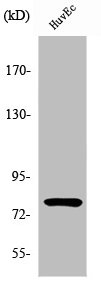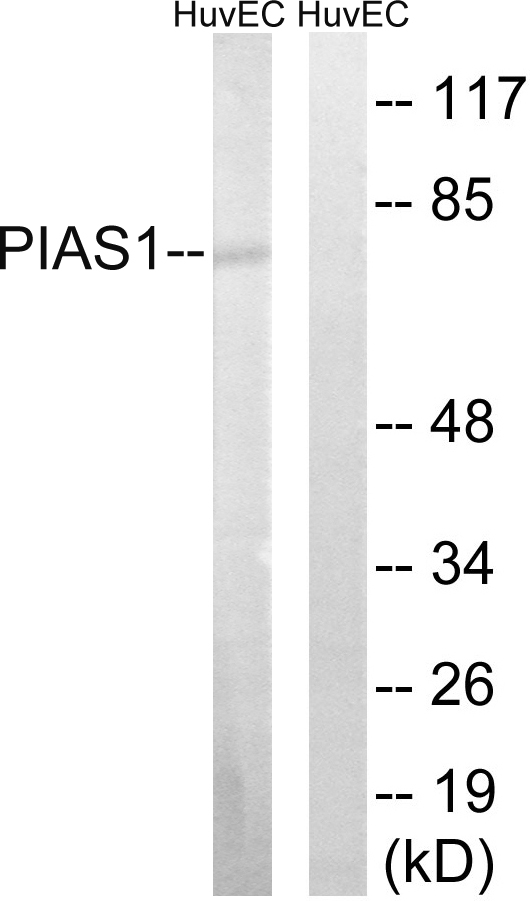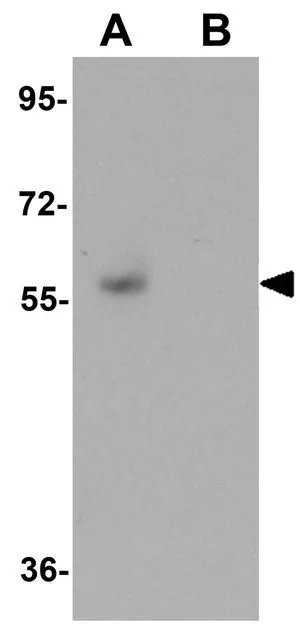![WB analysis of mouse lung tissue lysate using GTX03235 PIAS1 antibody [GT1323]. Dilution : 1:1000 Loading : 25μg per lane WB analysis of mouse lung tissue lysate using GTX03235 PIAS1 antibody [GT1323]. Dilution : 1:1000 Loading : 25μg per lane](https://www.genetex.com/upload/website/prouct_img/normal/GTX03235/GTX03235_38_WB_w_23053123_860.webp)
WB analysis of mouse lung tissue lysate using GTX03235 PIAS1 antibody [GT1323]. Dilution : 1:1000 Loading : 25μg per lane
PIAS1 antibody [GT1323]
GTX03235
ApplicationsWestern Blot
Product group Antibodies
ReactivityHuman, Mouse
TargetPIAS1
Overview
- SupplierGeneTex
- Product NamePIAS1 antibody [GT1323]
- Delivery Days Customer9
- Application Supplier NoteWB: 1:500 - 1:2000. *Optimal dilutions/concentrations should be determined by the researcher.Not tested in other applications.
- ApplicationsWestern Blot
- CertificationResearch Use Only
- ClonalityMonoclonal
- Clone IDGT1323
- Concentration0.9 mg/ml
- ConjugateUnconjugated
- Gene ID8554
- Target namePIAS1
- Target descriptionprotein inhibitor of activated STAT 1
- Target synonymsDDXBP1, GBP, GU/RH-II, ZMIZ3, E3 SUMO-protein ligase PIAS1, AR interacting protein, DEAD/H (Asp-Glu-Ala-Asp/His) box binding protein 1, DEAD/H box-binding protein 1, E3 SUMO-protein transferase PIAS1, RNA helicase II-binding protein, gu-binding protein, protein inhibitor of activated STAT protein 1, zinc finger, MIZ-type containing 3
- HostRabbit
- IsotypeIgG
- Protein IDO75925
- Protein NameE3 SUMO-protein ligase PIAS1
- Scientific DescriptionThis gene encodes a member of the protein inhibitor of activated STAT (PIAS) family. PIAS proteins function as SUMO E3 ligases and play important roles in many cellular processes by mediating the sumoylation of target proteins. This protein plays a central role as a transcriptional coregulator of numerous cellular pathways includign the STAT1 and nuclear factor kappaB pathways. Alternate splicing results in multiple transcript variants. [provided by RefSeq, Mar 2016]
- ReactivityHuman, Mouse
- Storage Instruction-20°C or -80°C,2°C to 8°C
- UNSPSC41116161

![Various whole cell extracts (30 μg) were separated by 7.5% SDS-PAGE, and the membrane was blotted with PIAS1 antibody [GT1323] (GTX03235) diluted at 1:1000. The HRP-conjugated anti-rabbit IgG antibody (GTX213110-01) was used to detect the primary antibody. Various whole cell extracts (30 μg) were separated by 7.5% SDS-PAGE, and the membrane was blotted with PIAS1 antibody [GT1323] (GTX03235) diluted at 1:1000. The HRP-conjugated anti-rabbit IgG antibody (GTX213110-01) was used to detect the primary antibody.](https://www.genetex.com/upload/website/prouct_img/normal/GTX03235/GTX03235_4000001116_20210709_WB_w_23053123_931.webp)
![WB analysis of various samples using GTX03235 PIAS1 antibody [GT1323]. Dilution : 1:1000 Loading : 25μg per lane WB analysis of various samples using GTX03235 PIAS1 antibody [GT1323]. Dilution : 1:1000 Loading : 25μg per lane](https://www.genetex.com/upload/website/prouct_img/normal/GTX03235/GTX03235_37_WB_w_23053123_725.webp)





